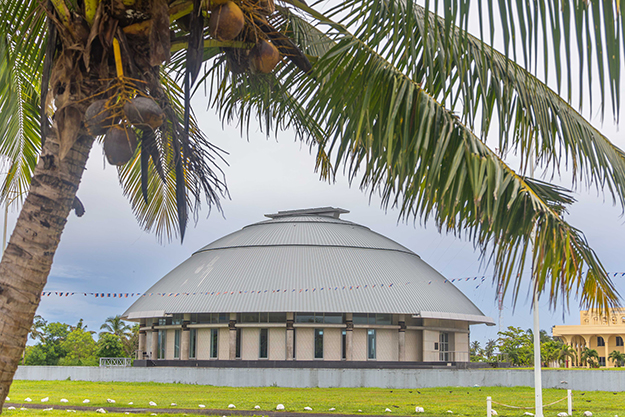Samoa

Overview
Samoa is a Polynesian country northeast of Fiji. Samoa consists of four inhabited and a number of smaller, uninhabited islands. The capital and economic hub Apia is located on Upolu, the most populous of the islands. Upolu and Savai'i, the other main island, account for 99 per cent of Samoa's 205,557 population (2021).
In 1962, Samoa became the first Pacific island country to achieve independence.
Political overview
Samoa is a parliamentary democracy. Samoa's constitution and its political system takes substantial account of Samoan traditions and culture.
Samoa's Head of State His Highness Tuimaleali’ifano Va’aleto’a Sualauvi II was sworn in on 21 July 2017.
The National Legislative Assembly is elected by universal suffrage for five-year terms, with all seats reserved for matai – people who have chiefly status in Samoa's villages. The Prime Minister is the Hon Fiamē Naomi Mata'afa following an election on 9 April 2021. Fiamē is the first female Prime Minister of Samoa.
The 2016 election was the first time Samoa enacted a constitutional reform reserving 10 percent of seats for women electoral candidates. If fewer than 10 percent of existing seats are won by women, additional seats are added to be held by women candidates with the highest number of votes. This reform legislation was passed in 2013 and was the first introduced in a Pacific island country.
Samoa has an independent judiciary and a separate court to resolve disputes over land and traditional titles.
Bilateral relations
The Independent State of Samoa and Australia established diplomatic relations on 31 March 1971.
Australia and Samoa are close partners with a longstanding relationship that is underpinned by mutual respect and trust. The partnership’s foundation and future direction are set out in The Australia-Samoa Bilateral Partnership Arrangement [Ole Fala Folasia I Lo Ta Va – The Map that Guides Us], launched by Prime Minister Albanese and Prime Minister Fiamē in March 2023. The Map commits to strengthening cooperation through strategic alignment in diplomatic, development and economic engagement across five priority areas, with cooperation to be guided by shared principles.
Economic overview
Samoa's economy was heavily impacted by COVID-19. Despite this, Samoa is demonstrating strength, resilience and leadership in its recovery. Tourism is rebounding strongly following the reopening of international borders in August 2022, with visitors to Samoa in 2023 reaching 113.9 per cent of 2018-19 levels.
Samoa has one of the largest diasporas in the Pacific. Around 80 per cent of Samoan households receive remittances from Samoans working abroad (primarily Australia, New Zealand and the United States). In 2023, remittances accounted for around 28 per cent of Samoa’s GDP. Foreign development assistance in the form of grants and direct aid is also an important component of the economy. Approximately 60 per cent of the population is employed informally and work in subsistence agriculture or local commercial ventures.
Key domestic sectors are services, tourism and agriculture.
Trade and investment
Australia is a significant export destination and source of imports for Samoa. Major exports to Samoa include ships, boats, medical equipment and medicines, meat and dairy products.
Find out more information about Australia’s trade and investment with Samoa.
ANZ Bank has a commercial bank in Samoa.
People-to-people links
Labour Mobility
Samoa participates in the Pacific Australia Labour Mobility (PALM) Scheme, which enables Samoan workers to access skills development and income generation opportunities by working in priority Australian industry sectors. PALM makes significant contributions to sustaining Samoa’s economic growth and resilience by facilitating flows of remittances skills development and investment. PALM also helps create strong links between people, business, and communities, fostering deeper connections between Australia and Samoa. Australia values its long-standing labour mobility partnership with Samoa. Australia recognises the challenges the program presents in relation to workforce and social issues and is working to address them in close collaboration with all Pacific partners.
As at December 2024 there were 2,510 Samoan workers in Australia under the PALM scheme.
For more information visit Pacific Australia Labour Mobility scheme website.
Security cooperation
Australia and Samoa enjoy a strong security partnership. In 2009, the Australian Federal Police (AFP) and the Samoa Police, Prisons and Corrections Service (SPPCS) signed the Samoa-Australia Policing Partnership (SAPP), to enhance the performance and responsiveness of the SPPCS. The AFP currently has three members deployed to Samoa, including one member supporting the Pacific Transnational Crime Coordination Centre in Apia.
The Australian Defence Force also supports Samoa's maritime security through the Pacific Maritime Security Program (PMSP). Samoa’s new Guardian Class Patrol Boat Nafanua III, gifted through the PMSP arrived in Apia on 19 January 2024.
Diaspora
The 2021 census recorded over 98,000 Australians identifying themselves as of Samoan ancestry. There are a number of high-profile Australians with Samoan heritage who compete as professional athletes, especially in netball, rugby and rugby league. Due to the large Samoan diaspora in Australia there are significant church and community organisation links.
New Colombo Plan
Since 2014, the New Colombo Plan has awarded eight scholarships and 802 mobility grants for Australian undergraduates to undertake study, language training and internships in Samoa.
Australia Awards
Australia is helping Samoa to build a skilled workforce through scholarships for Samoans to study at tertiary institutions in Australia and the region. The Awards enable students to gain the skills and knowledge needed to contribute to Samoa's development.
Australia Awards are offered in specialised fields such as science, health, education and engineering. Graduates are in high demand when they return home.
Since 2007, more than 500 Samoan Australia Award alumni have graduated with relevant qualifications to address human resource gaps in the workforce.
A study conducted by the Lowy Institute in November 2011 found that 25 per cent of Samoa's leaders had received a tertiary scholarship funded by Australia. This demonstrates the major contribution that Australian scholarships have made in supporting the learning opportunities and outcomes of Samoans.
High level visits
See High level visits to Samoa



